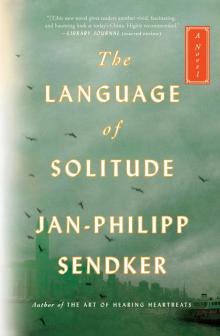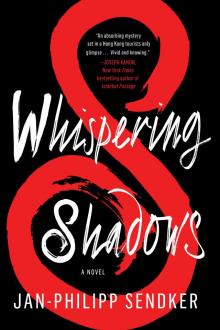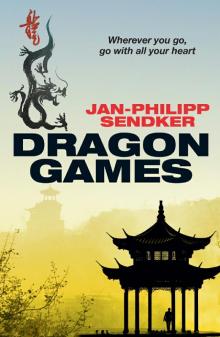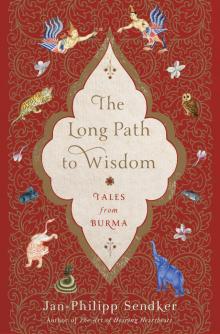- Home
- Jan-Philipp Sendker
The Language of Solitude Page 13
The Language of Solitude Read online
Page 13
A few months after that, eight young people from Chengdu, the capital of the province, arrived. One of them was Min Fang. She was four years older than Da Long and was the daughter of a music teacher and a doctor. This fact, along with her habit of constantly singing or humming songs that neither the farmers nor their leader knew, quickly made her an outsider, though that hardly seemed to bother her.
She was tall and sturdily built, and treated the stammering Da Long like a younger brother who had been a cause of worry to his parents all his life, and whom she had had to take care of from an early age.
She helped him when he collapsed once again during the harvest and the farmers wanted to leave him lying on the ground. She was with him when he fell ill with a lung infection the following winter, dangling between life and death for many days and nights. No longer one of the living, not yet one of the dead. She brought his fever down with cold compresses; she rubbed herbal concoctions into his chest and back. When life finally gained the upper hand and the hunger returned, she shared her thin rice gruel with him so that he would regain his strength more quickly.
She dared to defend him when the party secretary announced at a meeting that Da Long’s mother and sister had fled to Hong Kong, and that this was further proof of his dubious class background, which should be punished with additional shifts at work.
They spent more and more time together, planting rice in the water-soaked earth shoulder to shoulder, harvesting the same fields, washing their clothes in the river together; each volunteered to join the other in the long journey on foot to the nearest town when something was needed urgently. Big sister. Little brother. Hand in hand.
She listened patiently to him when it took him several attempts to finish a sentence. She assured him that he had all the time in the world, even when he seemed to be stammering out the same meaningless sounds over and over again. He trusted her; gradually, in her presence, the words began to come more easily.
At some stage, something in him changed. He began to notice whom Min Fang spoke to and for how long, whom she smiled at, and whom she offered to help. His heart began to pound more fiercely when he saw her. He was suddenly impatient to see her, and felt restless when she turned up late to work in the field. He realized how beautiful she was. It was such a sudden discovery to him that it was as if he were seeing her for the first time. The little dimples in her cheeks when she laughed. Her big light-brown eyes that could shine so bright. Her long black hair that she wore in two thick braids, her strong arms and legs, which rippled with muscle when she lifted the heavy baskets filled to the brim with rice. Her firm breasts, which he could see when she bent low in front of him while planting rice, the memory of which kept him awake with excitement at night when he lay on the straw.
He had started to love her without realizing it.
She did not reject his courtship, but she set the pace at which they grew closer. Sometimes she avoided him, sometimes she teased him, and sometimes she allowed him a furtive kiss. Clumsy and careful. He did not detect the slightest uncertainty in her. It was as if she had seen this coming for a long time.
On one of their marches to their town, on one of the dreadful sweltering summer nights in Sichuan when even the animals cannot sleep, the younger brother became a lover.
It remained their secret for more than two years, carefully tended in dark moonless nights in the fields, in the woods, in rain shelters. When they were not alone, it was expressed in brief glances of longing, in tender touches that appeared accidental. Two years in which not a day passed that they did not see each other. In which the stammer grew less pronounced with every passing week until it disappeared altogether. For the first time in his life, Da Long had something that belonged only to him, that he did not want to share with anyone else; he, who had not distinguished the words “mine” and “yours” until then.
It remained their secret until the son of the party secretary saw them making love in a field instead of weeding, and told his father everything. The very next day, the party secretary called a gathering of the Committee for the Defense of the Revolution, as well as the rest of the village. They met in a large circle in the square at the end of the bridge where the rice was normally laid out to dry. In the middle were Min Fang and Da Long on two wooden stools. The Party Secretary stood in front, inviting the comrades to criticize them. Person after person stepped forward and poured scorn on their heads. Breaking the laws of the village and of the party. Undermining public morality. Their addiction to pleasure. Their profligacy. Their bourgeois egoism, which put their own lust over the common good.
After a dozen tirades that seemed never-ending, they were to admit their guilt and practice self-criticism. Da Long would have done it if he had understood why he should. He owed his life to Min Fang. Why should he have to justify himself? For having stopped stammering with her help? For desiring her? For loving her? For wishing that she could become his wife tomorrow, even though marriage was only permitted from the age of twenty-five, and he still had six years to wait? Was that why he was sitting there on this stool letting himself be cursed as a mangy cur, vermin, and unscrupulous riffraff?
No. A loud, clear, and firm no. Not said out loud yet, but sounding unmistakably within him.
It was the tentative beginning of his own Cultural Revolution, not the great proletarian one, but a small and quiet one. One that took place not on the streets but in the heart. One that damaged no human beings, only the immovability of his belief in the mighty words of the Great Chairman. In mighty words altogether. It would be a long path, his personal Long March, but even that had begun with a first step.
Da Long wanted to stand up; he prayed that his voice would not let him down this time. How credible could an accused person be if he stammered while defending himself? He wanted to fight back, to reject all the accusations as false; he could think of nothing else. Then he heard Min Fang speaking hesitantly.
Yes, they had made a mistake. Yes, they had been frivolous and dissolute. Yes, they had let themselves be carried away by lust and not shown the proper class consciousness. They deserved the comrades’ scorn. The fault was not Da Long’s but hers alone.
When he tried to interrupt her she hissed at him to be quiet.
She was four years older, Min Fang said, and she should have known better. She had let herself be overcome by short-lived romantic feelings, which, in the words of the Great Helmsman, were well known to be as fleeting as the light of a candle in a storm. She lacked discipline and self-control; this was a result of her decadent bourgeois upbringing by a doctor and a teacher. A music teacher! That was why she was here. To learn from the revolutionary farmers. To become a reliable servant of the party. Her mistakes would only spur her on to work more and to be harder on herself. She was prepared not to exchange a single word with Da Long for the next six months, to ignore him like a horse ignores flies. She was ready to accept any punishment that the Committee for the Defense of Revolution decreed, but she pleaded that they be given another chance. A revolutionary does not fall from heaven, Mao Zedong said; a young revolutionary makes mistakes in his youth. A young revolutionary gets things wrong. That is why he needs the help and the guiding hand of the older and experienced comrades. He is shaped by them, just as the glowing iron is formed by the hammer. She did not want to ask for mercy or forgiveness. Only for the firm, shaping hand of the revolution.
Da Long kept his head lowered; he stared at his knees and barely dared to move. He did not know what to think of her self-criticism. What were those strange Mao quotes that he had never heard of? He hoped that she hadn’t been foolhardy enough to simply make them up. If they caught her doing that, he would never see her again. Why was she distancing herself from him so severely? Did she fear the rage of the people so much?
Min Fang’s speech did not fall short of its intended effect. The indignant muttering in the village had been silenced; even the party secretary looked thoughtful. He announced that the committee would withdraw for a consulta
tion and make its decision known the next day.
The next morning, he declared that Min Fang and Da Long would have to write detailed self-criticisms, that they were to be given extra shifts, and that they would be in different work units for the next six months; any contact between them in this period was strictly forbidden.
Those six months were the longest of Da Long’s life. He saw Min Fang working in other fields from a distance. He sat in the communal kitchen for meals with her but was not allowed to say a word to her. She treated him as if he were invisible. Not a glance, not a gesture, not a smile. He was alone with his insecurity and the question of why she was turning her back on him so fully. The longer he thought about it, the clearer it was to him that there was only one answer: she no longer loved him. Romantic feelings were as fleeting as the light of a candle in a storm, she had said.
Almost two months passed before he finally got a message from her. A small, crumpled note in a short length of bamboo that he found in one of his socks one morning.
He who does not trust enough,
is not to be trusted.
He who does not know eternity,
does harm for no reason.
He who knows eternity is patient,
To be patient is to be impartial.
To be impartial is to be all-embracing.
To be all-embracing is to be heavenly.
To be heavenly is to love.
—Laozi
He was not sure if he fully understood everything she meant to say to him with these lines, but he could be sure of one thing—she loved him. What did these six months matter? Only to those who did not know eternity! Now it was just a question of tenacity and self-discipline, and those qualities he possessed, as long as they were not undermined by suspicion.
Only much later, when he heard stories of Red Guards who had fallen in love and made the mistake of not being willing to self-criticize and distance themselves from each other, leading to them being separated and sent to distant corners of the country, only meeting again, if at all, many years later, did he understand what she had done for him, for them both.
Nearly nine months after they were allowed to resume contact with each other, Min Fang fell pregnant. They knew that she would be forced to have an abortion, by violent means if necessary, but she succeeded in hiding her growing belly under the baggy work clothing until it was too late for that. They went to see the party secretary and asked for a special permit to get married.
He fixed them with his cold, hard gaze for a long moment. Da Long had the feeling that he now knew this man well enough to be able to read his expression. After more than eight years of permanent revolution, endless self-criticisms, and trials, the party secretary was tired. He was thinking about the bother it could cause him to separate the couple, to hold a tribunal, and to banish the woman to the city. He was wondering if he might even get the blame if the scandal became public, if he might be accused of neglecting his duties. Da Long and Min Fang had speculated that he did not have anything to gain by bringing charges against them, that he was sufficiently worn out to take the path of least resistance.
They were right. One week later they were allowed to get married, and two months later, their son, Xiao Hu, Little Tiger, was born.
* * *
The sun had set a long time ago. From the courtyard, only darkness came through the windows now. A little lamp next to Min Fang’s bed was the only light in the room. Da Long had been pacing up and down in the half darkness for hours. He did not know why all these memories had suddenly returned.
The day his father died. He did not often think about it. There had been times in his life when the memory of it seemed to have been extinguished, but recently it had been recurring often. It must be age, he thought. The memories appeared like trees in wreaths of thick mist, clearly visible one moment, then gone again in the next. It was strange, but he could not think of his father’s death in the past tense, only in the present. He hears screams from the top floor. Not heard. A human being lies in front of him. Not lay.
It must be because of his sister. She had brought the images back. It had been a mistake to turn to her in the first place. He had been stupid and naïve. He had made himself look ridiculous. He had guessed the truth, but had not wanted to leave any stone unturned. His sister was not a doctor. She had no money. She could not help him. The rest did not interest him.
She had told him a little about herself; it had been difficult for her, and he had found it difficult to follow her. She had expected him to ask questions; he had not failed to notice that, but he could not. This was about his wife’s life. There was no space inside him for new stories. Another time. Maybe.
Who could help him now? Dr. Zhou’s diagnosis had been as definitive as that of the doctors in Yiwu. Was that it?
Da Long stood still, took a few deep breaths, held his breath, and listened. Even the roar of the highway could no longer be heard. Hopeless. The silence in the room was deceptive; he could hear it quite well. The table and the chairs, the walls, and the couch had started speaking, and were whispering just one word: Hopeless.
He was on the verge of losing his mind. He was hearing voices where there were none; he had even started stuttering again. He went to Min Fang, felt her forehead with his lips to see if she had a fever, dissolved the two tablets to ease cramping that she had to take in some water every evening, and gave it to her in tiny sips. He looked in the pile of CDs for something suitable and chose the second movement of Schubert’s Violin Quintet in C Major. One of her favorite pieces. Yin-Yin had recorded it with four classmates shortly after her mother had fallen ill. Da Long pushed his wife gently to one side of the bed, lay down next to her, switched off the light, and switched on the CD player. Tears came to his eyes every time he heard the first sounds of Yin-Yin’s violin on this recording. He had never heard her play like this. Even though he was not the musical expert in the family, he could tell the difference in her playing. Her touch was so gentle and the sounds came from such fathomless depth and with such power that Da Long hardly dared to breathe. It was as though she were playing with all her might against the slow death of her mother.
He heard a quiet groan next to him. Was she in pain, or was she trying to say something to him? It sounded as though she was trying to hum something deep in her throat. How could the doctors claim that there was no light burning in her? Just because some instrument or another displayed wavy lines that were not the same as those of a healthy person. As though the inner life of a person could really be measured. As though we could express what goes on in a brain, a heart, and a soul in numbers, graphs, or tables. What do the healthy know about the world in which the sick live? What do the sighted know about the blind? The well fed about the hungry? What do we know about ourselves?
Da Long laid his head gently between her shoulder and her neck. She had started to smell different. That slightly sweet and sharp typical Min Fang smell, which he had fallen asleep next to every night and had woken up next to every morning for almost forty years, was beginning to fade. She is dying, Da Long thought. A little more with every breath, and he could do nothing to stop it. He wanted to hold her tight, to cling to her. This woman to whom he owed everything.
IX
* * *
Xiao Hu was not the kind of person who lingered long over bad news. He regarded his life as too short and too busy, his time as too precious, to spend much time on it. He believed that those who focused on problems saw problems everywhere; those who concentrated on solutions saw solutions. He behaved the same way with good news and bad news. He was convinced that this attitude was one of the reasons he had been practically untouched by negative events and influences through the years, and would remain so in the future. Apart from two exceptions. One of them was his mother’s illness.
What his friend the neurologist Zhou had reported to him from his trip to Yiwu had not been a surprise, but the diagnosis had upset him nevertheless, and he did not manage to get it out of his
mind for at least a couple of hours. Mama was lost. The light in her snuffed out. She would not come back again.
Xiao Hu sat on the twenty-first floor of the China Life building in Pudong and tried to concentrate. He had to prepare for a meeting of the legal department, which he had been head of for six months, but his thoughts kept sliding off in all kinds of different directions. He looked around his new office, which was bigger than the apartment he had spent his childhood in with Yin-Yin and their parents. That was not even including the adjoining bedroom, which came with his position, and in which his predecessor had slept with all the secretaries in the department. A city landscape stretched out on the other side of the floor-to-ceiling windows; a shiver still passed down his back at the sight of it. Roads, highways, and high-rise buildings as far as he could see. Directly in front of him was the new symbol of Shanghai, the mighty Pearl TV Tower. On the far left was the tallest building in China, the elegant Jin Mao skyscraper. If he stepped right up to the window, he could look directly into the construction sites on which half a dozen further skyscrapers were being constructed at breathtaking speed, a new floor every week. Growth knew no bounds. Not in this city.
On a clear day you could see the tops of the skyscrapers on People’s Square glinting in the sun on the other side of the Huangpu River. Not today. Today a gray-brown bell of haze and exhaust fumes hung over the city; even the tower of the Peace Hotel on the Bund could be seen only in outline.
There were two telephones and two computer screens on his desk; one of them showed live information from the Shanghai stock exchange. Alibaba had gone up. Sino Chemical too. PetroChina too. China Mobile by almost 10 percent. On paper, Xiao Hu had grown richer by almost 50,000 renminbi in the last twenty-four hours.

 The Language of Solitude
The Language of Solitude A Well-Tempered Heart
A Well-Tempered Heart The Art of Hearing Heartbeats
The Art of Hearing Heartbeats The Far Side of the Night
The Far Side of the Night Whispering Shadows
Whispering Shadows Dragon Games
Dragon Games The Long Path to Wisdom
The Long Path to Wisdom